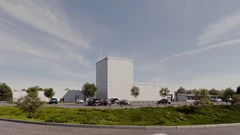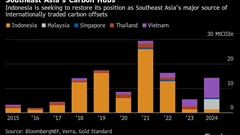Europe Car Sales Stagnate as Buyers Shun Electric Vehicles
(Bloomberg) -- European car sales barely grew last year as persistent inflation, higher borrowing costs and apathy toward electric models led consumers to hold off on buying vehicles.
New-car registrations in the region edged up 0.9% to 13 million units from a year earlier after a bounce in December, the European Automobile Manufacturers’ Association, or ACEA, said Tuesday. Sales of fully electric vehicles fell 1.3% after countries including Germany ended subsidies, dragging their share of the total market down to 15%.

Europe’s automakers are braced for another tough year in 2025, with stricter European Union emissions targets forcing them to sell more EVs despite the drop in demand. Having suffered from falling sales in China, the world’s largest car market, they now also face the threat of additional tariffs in the US under President Donald Trump.
Price pressure, market-share losses in China, tighter emissions regulations, tariff risks and continued lackluster demand are creating a “perfect storm” for European manufacturers this year, UBS analyst Patrick Hummel wrote in a note earlier this month.
New-car sales in Europe could fall in the first six months of 2025, according to analysts at Bloomberg Intelligence. But they predict price cuts in the second half of the year could lift them slightly.

While sales of fully electric cars have struggled, consumers are increasingly choosing models that combine a battery and a combustion engine as range anxiety persists. Plug-in hybrid sales in Europe fell over the course of the year but gained in December. Consumers’ preference for plug-in hybrids over fully electric cars in the US and Europe has complicated carmakers’ EV strategies and led some to add more hybrid models.
Demand for fully electric cars was particularly weak in the European Union in December, with a 10% drop in registrations when excluding countries like the UK. That contrasts with a 5.1% rise in overall EU car sales last month — or 4.1% when including all European countries.

The EU’s stricter limit on CO2 fleet emissions this year is piling pressure on carmakers to lift their share of battery-powered car sales or pay heavy fines. Germany’s VDA car lobby cited the new rules in its forecast that in-country production of fully-electric cars will rise 30% this year, and that registrations will leap 75%.
The ACEA, now led by Mercedes-Benz Group AG Chief Executive Officer Ola Källenius, has called on the EU to revise the CO2 regulations and also strike a “grand bargain” with the Trump administration rather than impose tit-for-tat tariffs on imported goods.
After the removal of EV state subsidies in Germany led battery-powered car sales to collapse last year, local automakers are calling for more support for the industry ahead of early elections in February. VDA chief Hildegard Müller said partnerships and trade agreements would be crucial to support Germany’s competitiveness and growth.
Friedrich Merz, the conservative frontrunner for chancellor, wants sales of new combustion-engine vehicles to continue beyond the planned 2035 EU ban, while incumbent Olaf Scholz has called for EV tax incentives.
(Adds comments from German car lobby.)
©2025 Bloomberg L.P.
KEEPING THE ENERGY INDUSTRY CONNECTED
Subscribe to our newsletter and get the best of Energy Connects directly to your inbox each week.
By subscribing, you agree to the processing of your personal data by dmg events as described in the Privacy Policy.
More utilities news

Uniper JV Builds Swedish Test Reactor in State Nuclear Push

Nuclear Power Startup Wants to Harness India’s Untapped Deposits

Indonesia Opens Domestic Carbon Market to Global Investors

Modi Woos Global EV Investors in India’s Push For Green Energy

Iceland Energy Minister Plans to Speed Up New Power Plants

Aramco plans transition minerals JV with Ma’aden

Edison Move to Keep LA Power Lines Operating Draws Scrutiny

Dozens Missing in LA as High Winds Threaten to Spark More Fires

Los Angeles Fires Rage as High Winds Set to Return This Week
















